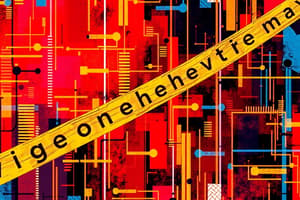Podcast
Questions and Answers
What is the first task investigators perform when working with digital evidence?
What is the first task investigators perform when working with digital evidence?
- Analyze and identify evidence
- Secure the crime scene
- Rebuild evidence for verification
- Collect, preserve, and document evidence (correct)
According to U.S. courts, how is digital evidence treated?
According to U.S. courts, how is digital evidence treated?
- As an abstract concept
- As mere data without value
- As physical evidence (correct)
- As intangible information
Which ISO standard provides guidance on procedures for managing digital evidence?
Which ISO standard provides guidance on procedures for managing digital evidence?
- ISO 27037 (correct)
- ISO 9001
- ISO 31000
- ISO 14001
What is essential for minimizing confusion when collecting digital devices at a crime scene?
What is essential for minimizing confusion when collecting digital devices at a crime scene?
What type of evidence can be accepted in court as mentioned in the content?
What type of evidence can be accepted in court as mentioned in the content?
Which of the following tasks is NOT typically performed by investigators when handling digital evidence?
Which of the following tasks is NOT typically performed by investigators when handling digital evidence?
What describes digital evidence most accurately?
What describes digital evidence most accurately?
Why is digital data difficult to explain and describe?
Why is digital data difficult to explain and describe?
What is required for the plain view doctrine to apply during a search?
What is required for the plain view doctrine to apply during a search?
Which step is NOT part of preparing for a search and seizure of digital devices?
Which step is NOT part of preparing for a search and seizure of digital devices?
What must be included in the search warrant issued to police officers?
What must be included in the search warrant issued to police officers?
What is referred to as 'innocent information' in the context of search warrants?
What is referred to as 'innocent information' in the context of search warrants?
Which of the following is a primary objective when securing a digital crime scene?
Which of the following is a primary objective when securing a digital crime scene?
Which of the following is NOT one of the three criteria for the plain view doctrine?
Which of the following is NOT one of the three criteria for the plain view doctrine?
What is the most critical step in the process of digital investigations?
What is the most critical step in the process of digital investigations?
Which of the following describes 'commingled evidence'?
Which of the following describes 'commingled evidence'?
What should be done if there is too much evidence for one team to manage?
What should be done if there is too much evidence for one team to manage?
What is a characteristic of computer-generated records?
What is a characteristic of computer-generated records?
Why is establishing the creator of digital evidence often difficult?
Why is establishing the creator of digital evidence often difficult?
What is the benefit of standardized forms in evidence handling?
What is the benefit of standardized forms in evidence handling?
What is a key requirement to demonstrate the authenticity of computer-stored records?
What is a key requirement to demonstrate the authenticity of computer-stored records?
What is NOT a type of digital record used in evidence collection?
What is NOT a type of digital record used in evidence collection?
What must be ensured when collecting evidence at a crime scene?
What must be ensured when collecting evidence at a crime scene?
Which option describes computer-stored records?
Which option describes computer-stored records?
What type of evidence do attorneys commonly use to establish authorship of digital evidence?
What type of evidence do attorneys commonly use to establish authorship of digital evidence?
What is a common challenge brought up by attorneys regarding computer-generated records?
What is a common challenge brought up by attorneys regarding computer-generated records?
What assumption do most federal courts make about digital evidence from computer-generated records?
What assumption do most federal courts make about digital evidence from computer-generated records?
Which of the following does NOT represent a challenge to the authenticity of computer-generated records?
Which of the following does NOT represent a challenge to the authenticity of computer-generated records?
What is a significant characteristic of investigating computer incidents in private-sector organizations compared to crime scenes?
What is a significant characteristic of investigating computer incidents in private-sector organizations compared to crime scenes?
What role do ISPs play in investigating computer abuse by employees?
What role do ISPs play in investigating computer abuse by employees?
In what situation can business-records exception to hearsay be applied?
In what situation can business-records exception to hearsay be applied?
What must private-sector organizations typically have to successfully manage digital evidence?
What must private-sector organizations typically have to successfully manage digital evidence?
What role do digital investigators typically play in securing a major crime scene?
What role do digital investigators typically play in securing a major crime scene?
What can lead to the loss or corruption of evidence at a crime scene?
What can lead to the loss or corruption of evidence at a crime scene?
What is a key difference between law enforcement and private-sector investigators regarding seizing digital evidence?
What is a key difference between law enforcement and private-sector investigators regarding seizing digital evidence?
When preparing to acquire digital evidence, which item is typically considered essential in a case involving drug-related activities?
When preparing to acquire digital evidence, which item is typically considered essential in a case involving drug-related activities?
Which of the following is a factor that complicates predicting which digital components might be critical to a system's operation?
Which of the following is a factor that complicates predicting which digital components might be critical to a system's operation?
In digital crime scenes, officers who are not part of the processing team but are present can affect the investigation how?
In digital crime scenes, officers who are not part of the processing team but are present can affect the investigation how?
What type of evidence is considered physical by courts when it is found on a computer?
What type of evidence is considered physical by courts when it is found on a computer?
During which scenario might you only need to seize specific items instead of the entire system?
During which scenario might you only need to seize specific items instead of the entire system?
Flashcards are hidden until you start studying
Study Notes
Digital Evidence
- Digital evidence can be any information stored or transmitted digitally.
- Although it is difficult to see or touch digital data, it is considered physical evidence by US courts.
- Countries have their own interpretation of digital evidence admissibility in court.
- ISO standard 27037 provides guidance on procedures for handling digital evidence.
- Digital evidence should be collected systematically to avoid confusion, minimize risk of losing data, and prevent damage.
- Investigators must perform tasks such as:
- Identify digital information or artifacts that can be used as evidence.
- Collect, preserve, and document evidence.
- Analyze, identify, and organize evidence.
- Rebuild evidence or repeat a situation to verify results.
Identifying Digital Evidence
- Categorize digital records as either:
- Computer-generated records: data generated by a computer system, such as system logs and proxy server logs.
- Computer-stored records: data created by a person and saved on a computer, generally user-generated records, such as spreadsheets or word processing documents.
- Authentication of computer-stored records can be tested by demonstrating the creator of the records.
- Records recovered from slack or unallocated disk space often lack authorship information.
- To determine authorship of anonymous email or text messages, attorneys may use circumstantial evidence.
- Attorneys may challenge the authenticity of computer-generated records by questioning the program that created them.
- Courts have generally been skeptical of unsupported claims about digital evidence alteration.
Collecting Evidence in Computer Incident Scenes
- Private-sector organizations include small to medium businesses, large corporations, and non-government organizations (NGOs).
- Inventory databases in private-sector organizations can aid in identifying forensics tools needed for analysis.
- ISPs have special considerations for investigating computer abuse committed by employees, while preserving customer privacy.
- Investigating and controlling computer incident scenes in private-sector environments is generally easier than in crime scenes.
- Police officers can obtain search warrants from a judge to authorize searches and seizures of specific evidence.
Terms Used in Warrants
- Unrelated information is often included with evidence, referred to as “innocent information”.
- Judges may issue a limiting phrase to a warrant, allowing the police to separate innocent information from evidence.
- The "plain view doctrine" allows for seizure of evidence not specified in a warrant if it is in direct sight of an officer legally present in a location.
- The plain view doctrine applies when:
- The officer has a legal right to be in the location.
- Ordinary senses are not enhanced by advanced technology.
- Any discovery is made by chance.
Preparing for a Search
- Steps for evidence search include:
- Identifying the nature of the case.
- Identifying the type of operating system or digital device.
- Determining whether computers and digital devices can be seized.
- Getting a detailed description of the location.
- Determining who is in charge.
- Determining the tools needed.
- Preparing the investigation team.
Securing a Digital Incident or Crime Scene
- Investigators secure a crime scene to preserve evidence and keep information confidential.
- Digital investigators might not be responsible for defining the security perimeter of major crime scenes.
- Computers can be a crime scene within a crime scene, containing evidence to be processed.
Securing a Digital Incident or Crime Scene
- Professional curiosity can lead to loss or corruption of evidence due to the presence of unauthorised individuals.
- Even authorized and trained personnel can inadvertently alter a crime scene or evidence.
Seizing Digital Evidence at the Scene
- Law enforcement can seize all digital systems and peripherals with proper search warrants.
- Private-sector investigators may have similar authority, but might only be authorized to create an image of the suspect's drive.
- Private-sector investigators rarely have the authority to seize all computers and peripherals, depending on company policies.
Preparing to Acquire Digital Evidence
- The evidence acquired at the scene depends on the nature of the case and alleged crime.
- Seizing peripherals and media ensures no critical system components are left behind.
- In employee misconduct investigations, specific items may be sufficient for evidence acquisition.
Studying That Suits You
Use AI to generate personalized quizzes and flashcards to suit your learning preferences.




